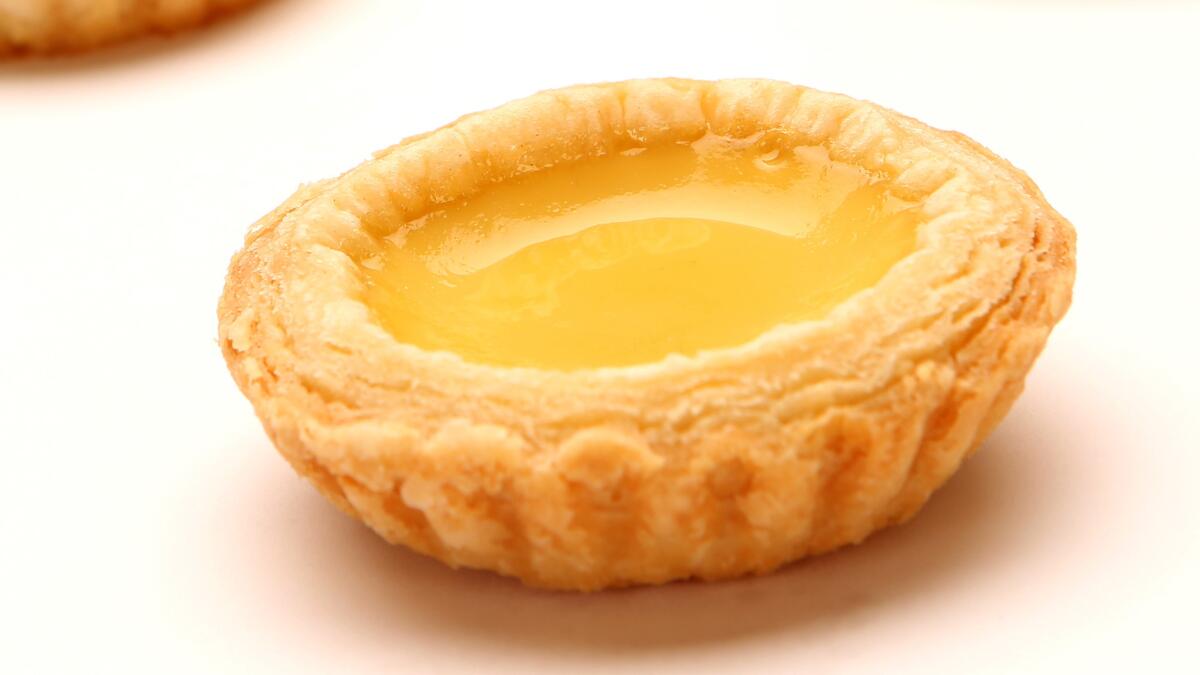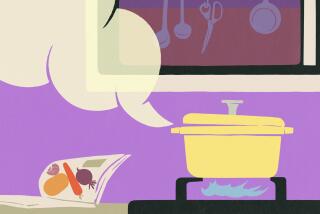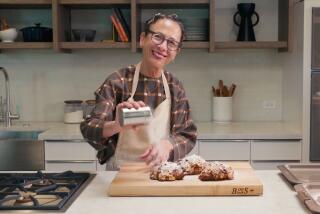Cookbook of the Week: ‘All About Eggs,’ the last cookbook from Lucky Peach, plus an egg tart recipe
Hindsight is a funny thing, loaded with irony and regret and a kind of impossible nostalgia, a quality that should, by definition, require more than a few months to accumulate meaning. Think about politics, of course. Think about eggs. Eggs? Well, yes, because we’re talking about Lucky Peach, the recently-shuttered food magazine, and “All About Eggs,” the fourth and final cookbook by the editors of that publication, which came out in April.
So you read this last Lucky Peach cookbook, written by Rachel Khong with more than 50 ancillary contributors, in a kind of vertigo, flipping the pages — and sometimes the actual eggs — with a heady mixture of hunger, amusement and sadness. It is almost impossible not to find a double meaning spilled through the pages like curry sauce. This, of course, has always been part of the fun of Lucky Peach, a publication that was known for its mash-up assembly of excellent and irreverent writing about food, science and culture.
The conceit of this cookbook is that it’s a primer about eggs, that most basic of ingredients, the dish that many of us first learn to cook — “everything we know about the world’s most important food,” according to the subtitle. And the book delivers on much of that, providing 88 recipes and many stories, tips and anecdotes culled from a multicultural and multinational array of great chefs, food writers, food scientists, television personalities, physicists, novelists and more.

Recipe: Yank Sing’s egg tarts »
“And so we come — almost! — to the end. Eggs existed before you and me, and eggs will outlive us all. This thought is either comforting or terrifying, depending on the sort of day you’re having,” writes Khong in the preface to the eighth and last chapter of the book: Immortal Eggs. This is both the tone and content that she set in the first page (“This is a book about eggs. But more than that, it’s a book about mankind — it’s a book about us all.”) and has continued throughout, as have her fellow writers. (It should come as no surprise that Khong, who was a contributing editor and worked at Lucky Peach since its start in 2011, is also a San Francisco-based novelist: Her first novel comes out in July.)
That said, “All About Eggs” can read like a cacophony at times, as it’s sometimes hard to figure out which voice is which, and whose recipe is exactly whose. The photographs (which along with the playful illustrations are by Tamara Shopsin and Jason Fulford), on black background and oddly stark, are cordoned off into one yellow-edged section midway through the book. This is also where you’ll find the index, separate from the list of contributors, which is itself at the end of the book. All this means that you end up toggling back and forth a lot, trying to match the bits of prose with their authors.
It should also be said that some of the recipes in the book presuppose a certain expertise. Daniel Boulud’s famous “perfect” omelette farcie, for example, is both daunting on the page and in execution, and I found myself watching the legendary French chef demo the dish on YouTube before I got it right. (Even if you’ve already mastered the dish, I recommend doing this, also because it’s enormous fun.) And the Hong Kong-style egg tart recipe from San Francisco restaurant Yank Sing required a few test runs in our Test Kitchen to get the mechanics of homemade puff pastry just right. Other recipes worked perfectly on the first go-around. This kind of inconsistency can be comforting (leave the omelet to the experts and flip to the bit about egg crystals on Mauna Loa Mars) or terrifying, depending on the sort of day you’re having.
But this also makes Khong’s original point, which is that eggs are harder than they look; there is a reason that making an omelet is the cook’s traditional, oft-cited rite of passage.
Quite aside from being a useful cookbook, it’s an utterly marvelous, often hilarious read. Where else can you find a few pages from Harold McGee next to a recipe for Arzak eggs, a literary anecdote about an egg collector (“Claude lived alone, a mélomane surrounded by his arias”) near a bit about what to name your chicken (Barbara, or maybe Eldrida) and something called Chickens of Portlandia? Writing about a dish called Eggs Kejriwal, yet another in the procession of gifted writers notes that one will need “a processed white cheese that melts like rubber and tastes like nostalgia.” Exactly. This is a cook’s cookbook, a writer’s cookbook, a reader’s book. RIP LP.
Cookbook of the Week: “All About Eggs,” by Rachel Khong and the editors of Lucky Peach (Clarkson Potter, $26)
YANK SING’S EGG TART
1 hour, plus chilling times. Makes 6 to 12 tarts, depending on size.
EGG CUSTARD
1 cup water
½ cup sugar
4 eggs
¼ cup evaporated milk
½ teaspoon vanilla extract
Salt
Prepared tart shells
1. In a saucepan, combine the water and sugar over medium heat and cook, stirring occasionally, until the sugar dissolves, 3 to 5 minutes. Remove from heat and cool the syrup.
2. In a large bowl, whisk the eggs into the sugar syrup. Stir in the evaporated milk, vanilla and a pinch of salt. Strain the mixture through a fine-mesh strainer into a container with a pouring lip. This makes a generous 2 cups filling, which will keep up to 3 days. Cover and refrigerate for several hours before using to allow any air incorporated from whisking to dissipate before baking.
PUFF PASTRY AND ASSEMBLY
¾ cup (1 ½ sticks) cold butter, cut into 1-inch cubes
1 ½ (6.4 ounces) cups all-purpose flour, divided, more as needed
1 egg
2 tablespoons water
Egg custard
1. In a large bowl, use a pastry knife or fork to mash the butter with ¾ cup of the flour, just enough until it will clump together (there will still be bits of butter showing), to form an “oil dough.” Flatten the dough out into a square and refrigerate until well-chilled, at least 20 minutes.
2. Meanwhile, in a separate bowl, mix the egg and water into the remaining ¾ cup flour to form a “water dough.” If the dough is too soft, work in extra flour, a tablespoon at a time. Knead the dough until it is soft but still tacky, then form into a square about the same size as the oil dough. Cover and refrigerate until well-chilled, at least 20 minutes.
3. Flour a work surface and remove the water dough from the refrigerator. Roll the dough out to a rectangle twice the size of the oil dough.
4. Take the oil dough out of the refrigerator and spread it out on top of the water dough, leaving a large enough border of the water dough to be able to fold over the oil dough entirely. Fold the sides of the water dough over the oil dough. If the dough begins to warm and soften at any time while folding, refrigerate or freeze it until it is firm and chilled again before proceeding.
5. Roll the entire dough out to a large rectangle about the size of a sheet of paper (8 ½ by 11 inches), and mark it into thirds. Fold each outer third over the center third, as if folding a letter, and roll the dough out into a large rectangle again. If the oil dough pops through at any time, “patch” the hole with flour to seal. Repeat three more times, chilling the dough as needed to keep it very cold.
6. On a lightly floured work surface, roll the dough out to a 1/4-inch thickness. Cut out disks using a round cutter that are slightly larger than the diameter of your tart molds (for example, cut 4-inch rounds if using 3-inch tart shells measured at the base, with 1/2-inch sides).
7. Lightly grease the inside of your fluted tart molds and gently press the pastry disks into the molds. Chill at least 20 minutes before baking. Meanwhile, heat the oven to 350 degrees.
8. Fill each prepared tart shell three-fourths of the way up with egg custard.
10. Position the tarts evenly on a baking sheet and place in the oven. Bake until the crust is puffed and lightly colored, and the filling is set (it should barely jiggle when tapped), 30 to 45 minutes. Baking times will vary depending on the size and depth of the tarts. Remove from the oven and set aside to cool for 5 to 10 minutes, then carefully tap the molds to remove the tarts.
Each of 12 servings: Calories 227; protein 5 grams; carbohydrates 21 grams; fiber 0; fat 14 grams; saturated fat 8 grams; cholesterol 110 mg; sugar 9 grams; sodium 37 mg
Note: Adapted from a recipe in “All About Eggs” by Rachel Khong and the editors of Lucky Peach.
ALSO:
Cookbook of the week: ‘Tartine All Day’ from Elisabeth Prueitt, the co-founder of Tartine
Cookbook of the week: ‘The Wurst of Lucky Peach,’ plus your Lucky Peach book club update
Cookbook of the week: ‘In My Kitchen,’ by Deborah Madison, and a soup recipe
More to Read
Eat your way across L.A.
Get our weekly Tasting Notes newsletter for reviews, news and more.
You may occasionally receive promotional content from the Los Angeles Times.







